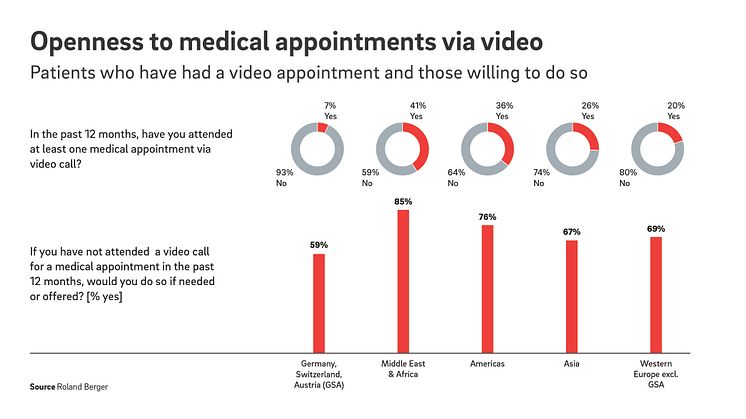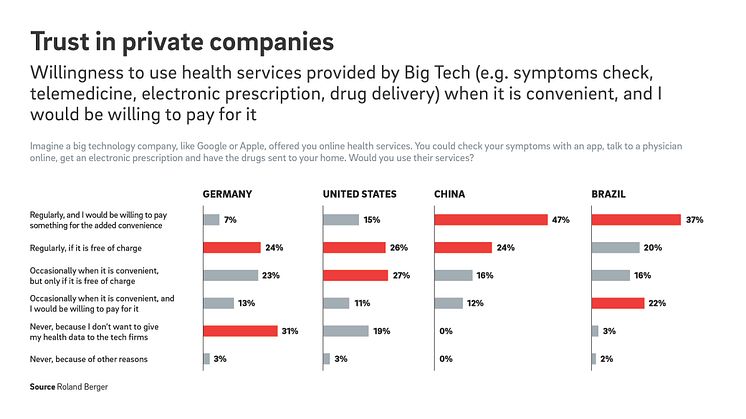
Press release -
A majority of consumers in the healthcare sector are open to innovations in medicine
- Traditional providers of health services enjoy the greatest trust
- For 63 percent of all patients surveyed, the best possible healthcare is more important than data protection
- 47 percent of German patients are prepared to use health services provided by private tech companies
- Health service providers should adapt their offerings to the needs of the respective patient types
Munich, September 2022: The healthcare market is growing and is increasingly driving medical and technological innovations forward. However, it will be consumers who decide whether digital offerings or new treatment options will prevail. Acceptance by these consumers will be the key to success in the healthcare sector. The factors that will determine this and the best way for players in the healthcare sector to respond to it are examined in the new Roland Berger study “Future of health – The patients of tomorrow.” Around 2,500 people from 19 countries were surveyed for this study.
“Traditional healthcare providers – physicians, hospitals, and pharmacists – still enjoy the greatest level of trust on the part of patients, unlike the companies behind digital platforms, for example. But the race is far from being over,” says Thilo Kaltenbach, Partner at Roland Berger.
The issue of data protection is quite prevalent in relation to innovations, but if consumers benefit directly from technological innovations, they are nevertheless open to them. For a majority of those surveyed – 63 percent – access to the best possible treatment matters more than data protection. There is clear potential here, especially in the DACH region: 59 percent are willing to hold a physician’s appointment by video call. In practice, however, only 7 percent took advantage of this offering in the past 12 months.
“In the end, the winners will be the players who provide the best medical evidence for the effectiveness of their offering. All players in the healthcare sector will need to make major efforts to overcome patient skepticism about innovative approaches and offerings,” says Oliver Rong, Partner at Roland Berger.
Trust is clearly divided
The greatest trust is enjoyed by traditional providers of health services. A large proportion of those surveyed are skeptical about involving private companies in ensuring their healthcare provision. The right communication will be crucial in persuading them. Only if the personal benefits are clearly visible and communicated, patients would be willing to share their data with digital providers.
New possibilities are emerging, as 72 percent of those surveyed are open, in principle, to a comprehensively coordinated health system – or would even prefer it. Provided they are free of charge, 47 percent of Germans would be willing to use healthcare services from private tech companies. 20 percent would still resort to paid services.
Demand for services is becoming more individualized
Since traditional health service providers enjoy the greatest trust, new players have to build stable relationships with the patients of tomorrow. “What is clear for all players is, that the approach they take must be differentiated for the diverse patients of tomorrow,” Rong says.
The results of the survey clearly lay out and define who those patient types are. There are the Adopters, of whom 41 percent – across all markets – are regularly using, and paying for, online health services. Then there are the Followers, for whom convenience is a crucial factor. There are also the Hesitant: 41 percent currently refuse categorically to use online services and to give their personal data to private providers.
“A tactic that works for young, healthy consumers in developing countries might not work with older consumers in worse health in industrialized countries,” Kaltenbach explains.
Topics
Roland Berger is the only strategy consultancy of European origin with a strong international presence. As an independent firm owned exclusively by our partners, we have 51 offices with a presence in all major markets. Our 2,700 employees are characterized by a unique combination of analytical thinking and an empathetic mindset. Driven by our values of entrepreneurial spirit, excellence, and empathy, we are convinced that business and society need a new, sustainable paradigm that focuses on the whole value-creation cycle. By working in interdisciplinary teams across all relevant sectors and business functions, Roland Berger offers the best expertise worldwide for successfully overcoming the profound challenges of our age now and in the future.




